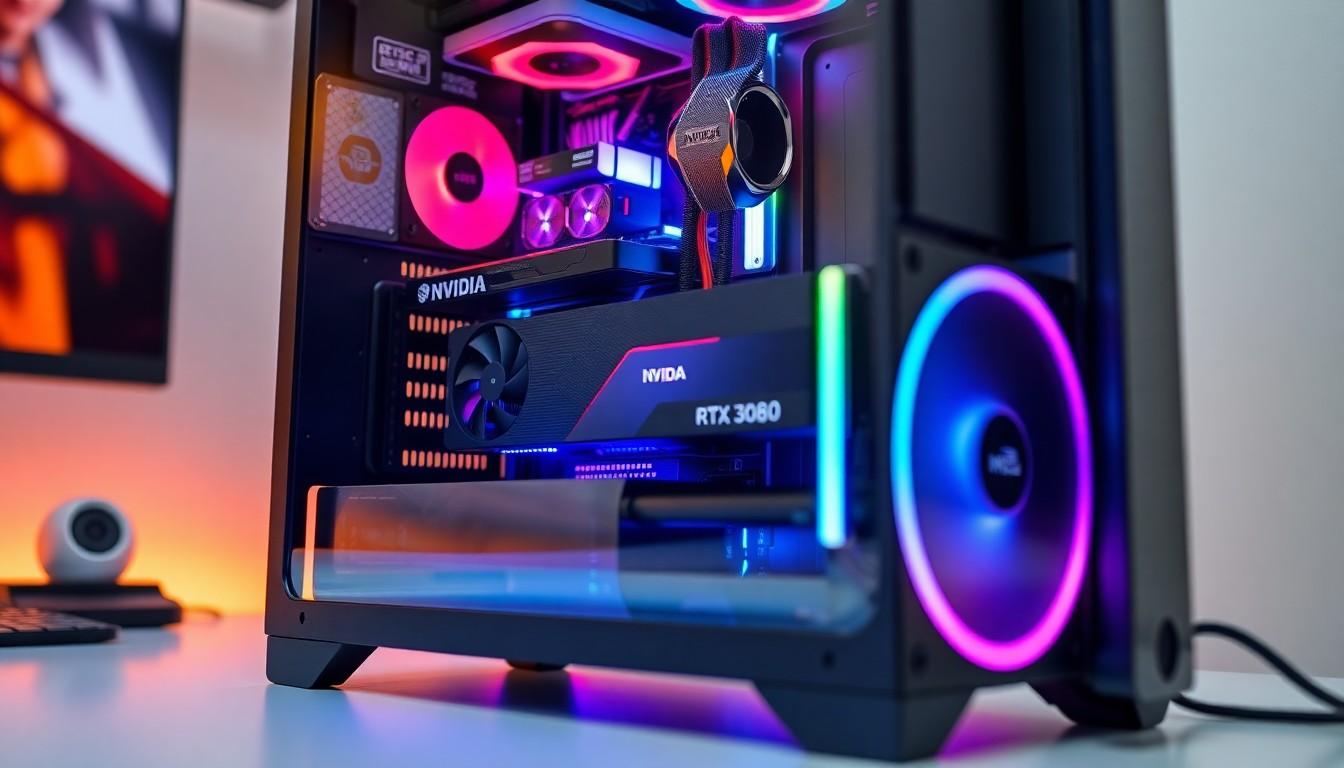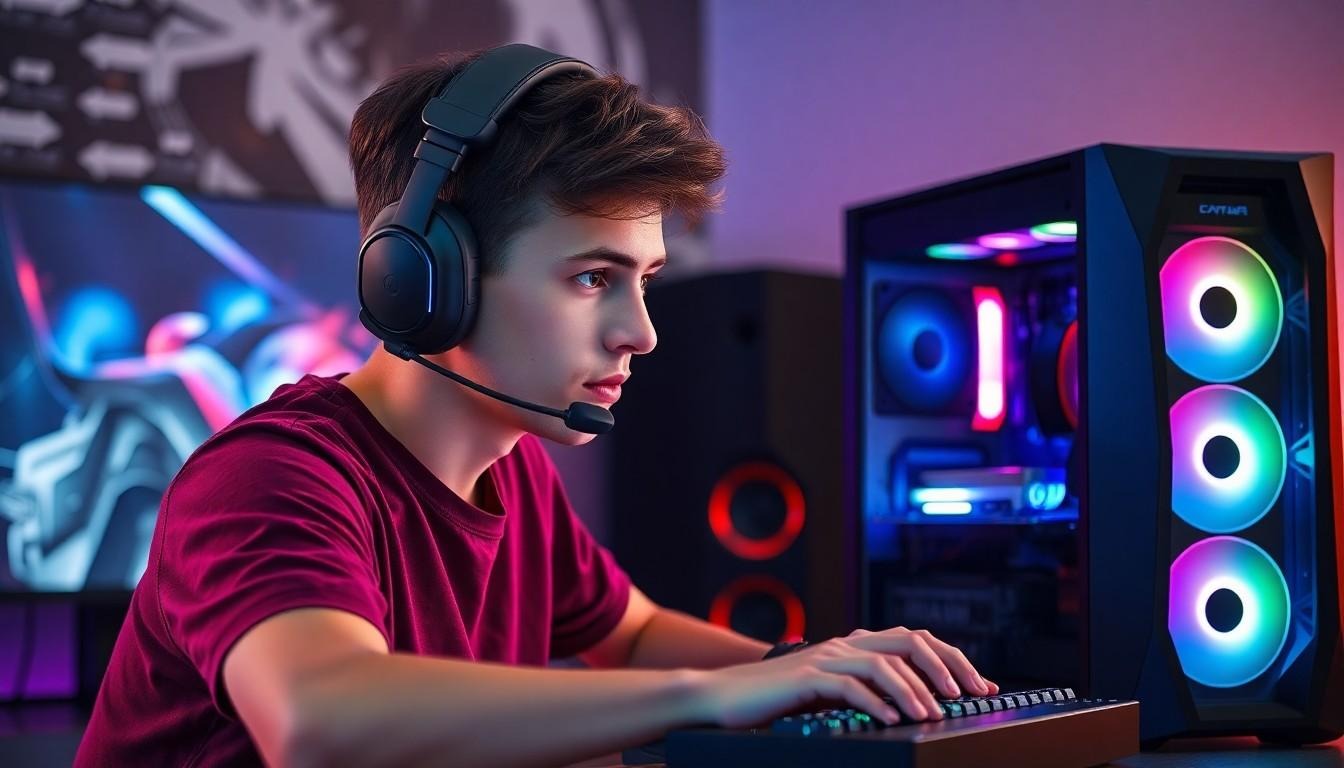In the electrifying realm of PC gaming, hardware is the unsung hero that transforms mere mortals into digital warriors. Whether it’s the heart-pounding thrill of a first-person shooter or the strategic depth of an RPG, the right gear can elevate the gaming experience from “meh” to “mind-blowing.” Think of it as the difference between a trusty wooden sword and an enchanted flaming sword—one just doesn’t cut it.
From graphics cards that render breathtaking worlds to processors that handle complex calculations at lightning speed, the right hardware can make all the difference. It’s not just about playing games; it’s about immersing oneself in vibrant universes where anything is possible. So buckle up and get ready to dive into the essential components that’ll have your gaming rig purring like a well-fed cat, ready to conquer every pixelated challenge that comes its way.
PC Gaming Hardware
PC gaming hardware encompasses several critical components that significantly impact performance and experience. Central to a gaming system is the CPU, which acts as the brain of the computer. A powerful CPU enhances frame rates and reduces lag, allowing for smoother gameplay.
Graphics cards serve as another essential element, responsible for rendering high-quality visuals. Advanced graphics cards support features like ray tracing and 4K resolution, providing realistic graphics and immersive environments.
RAM plays a vital role in multitasking and game load times. A system with at least 16 GB of RAM allows seamless switching between applications without sacrificing performance.
Storage options also influence gaming. Solid-state drives (SSDs) deliver faster load times compared to traditional hard drives, reducing wait times for players. Gamers often opt for SSDs for the operating system and frequently played titles, using larger hard drives for additional storage.
Cooling systems are necessary for maintaining optimal temperatures. High-performance CPUs and GPUs generate heat during intensive gaming sessions. Proper cooling solutions, including air and liquid cooling systems, prevent overheating and prolong the lifespan of components.
Lastly, peripherals like monitors, keyboards, and mice enhance gameplay. A high-refresh-rate monitor improves visual clarity during fast-paced action, while gaming mice with customizable settings allow for precision control.
Understanding these components helps gamers make informed decisions when building or upgrading their rigs. Optimal hardware selection ensures an unparalleled gaming experience.
Key Components of PC Gaming Hardware

Understanding core components helps gamers build effective systems for an optimal gaming experience. Every element plays a vital role in performance and enjoyment.
Processor (CPU)
The CPU acts as the brain of a gaming PC. It impacts frame rates, reduces lag, and manages game processing tasks. Models like the Intel Core i7 or AMD Ryzen 7 offer excellent performance for gaming. Gamers often prioritize higher clock speeds and multiple cores, boosting overall system efficiency. For demanding games, selecting a high-performance CPU ensures smooth operation. Keeping the CPU cool with adequate cooling solutions maximizes its longevity and performance during intense sessions.
Graphics Card (GPU)
The GPU significantly enhances visual quality, rendering graphics with precision. High-end models like NVIDIA RTX 3080 or AMD Radeon RX 6800 XT support advanced features, including ray tracing and 4K resolution. Gamers often seek GPUs with ample VRAM for more detailed textures and better frame rates. A capable graphics card plays a crucial role in immersive gaming experiences. Pairing it with the right monitor can further elevate the overall aesthetic quality.
Memory (RAM)
RAM influences multitasking capabilities and game load times. With at least 16 GB recommended, it allows for smoother gameplay and efficient background processing. Choosing faster RAM speeds also aids in overall system responsiveness. Less cluttered systems see improvements in data access speeds, allowing games to run without hiccups. Upgrading to higher capacities can accommodate resource-intensive titles without compromising performance.
Storage Solutions
Storage solutions affect game load times and system responsiveness. Solid-state drives (SSDs) outperform traditional hard drives, providing quicker access to data. Installing games on an SSD results in a noticeable reduction in load times. Many gamers opt for a combination of SSDs for the operating system and hard drives for additional storage. Selecting the right storage configuration enhances overall gameplay and user experience.
Essential Peripherals
Peripheral devices significantly influence the overall gaming experience. Selecting the right gear enhances performance and comfort during gameplay.
Monitors
Monitors serve as the primary visual interface for gamers. High refresh rates, such as 144 Hz or higher, reduce motion blur, providing smoother action. Resolution matters too; 1440p or 4K displays deliver brilliant detail. Consider response time, aiming for 1 ms to minimize lag. Features like G-Sync or FreeSync sync the monitor’s refresh rate with the graphics card, resulting in tear-free visuals. Many gamers prefer larger screens, typically ranging from 24 to 32 inches, for an immersive experience.
Keyboards and Mice
Keyboards and mice are essential for control and responsiveness. Mechanical keyboards, known for their tactile feedback, enhance typing speed and accuracy. Look for features such as customizable RGB lighting and programmable keys to tailor the setup. Gaming mice, often equipped with high DPI and adjustable weight, provide precision in movement. Opt for ergonomic designs to maintain comfort during long sessions. Many gamers select wireless options for a clutter-free workspace, while wired variants often ensure lower latency.
Headsets and Speakers
Headsets and speakers enhance audio immersion in gaming. High-quality headsets often include surround sound capabilities, allowing players to pinpoint enemy movements effectively. Comfortable ear cups and adjustable headbands prevent fatigue during extended gameplay. Noise-canceling features block distractions, creating an immersive atmosphere. Some gamers prefer speaker systems, using multi-channel setups to fill larger spaces with sound. Choosing the right audio components can significantly elevate the gaming experience, offering clearer communication with teammates and more impactful sound design.
Performance Considerations
Performance hinges on various factors, including overclocking, cooling solutions, and power supply units. Optimizing these elements can significantly enhance gaming experiences.
Overclocking and Cooling Solutions
Overclocking improves CPU and GPU performance by pushing them beyond factory settings. This process maximizes frame rates and reduces lag during gameplay. Efficient cooling solutions are critical to prevent overheating. High-quality air coolers or liquid cooling systems manage thermal output effectively. Gamers frequently use thermal paste and optimized case airflow to further enhance cooling. These practices ensure stable operation under pressure, maintaining system longevity and performance.
Power Supply Units (PSU)
Power supply units play a vital role in ensuring that all components receive adequate and stable power. Selecting a PSU with sufficient wattage and a good efficiency rating is essential. Gamers should opt for units rated 80 PLUS Gold or Platinum for reliability. Modular PSUs allow for cleaner cable management and easier upgrades. Keeping the power supply well-ventilated contributes to overall system stability, preventing potential failures. Properly investing in a robust PSU supports a high-performance PC gaming setup.
Trends in PC Gaming Hardware
Emerging trends in PC gaming hardware highlight a shift towards greater performance and customization. Increasingly, gamers prefer high-refresh-rate monitors, with 240 Hz displays gaining traction for ultra-smooth gameplay. Alongside visuals, the demand for immersive audio solutions has surged, encouraging the adoption of surround sound headsets and high-fidelity speakers.
Graphics cards continue to evolve, with features like real-time ray tracing becoming standard in models such as the NVIDIA RTX 40 series. Gamers seek out GPUs that optimize graphics performance while minimizing power consumption. This demand drives manufacturers to innovate in both performance and energy efficiency.
CPU advancements also shape the landscape. Multi-core processors dominate discussions, particularly those with at least eight cores, which enhance multitasking and significantly improve gaming performance. Both Intel Core i9 and AMD Ryzen 9 models illustrate this trend, offering unrivaled processing capabilities.
Furthermore, the popularity of SSD technology has soared, with gamers increasingly opting for NVMe drives. These drives deliver faster load times and better overall responsiveness compared to traditional SATA SSDs.
Cooling solutions have become a crucial focus, with liquid cooling systems gaining favor for their efficiency in maintaining optimal temperatures during intense gaming sessions. Customizable RGB lighting in cooling units also attracts attention, as gamers prioritize aesthetics alongside functionality.
Ultimately, the integration of AI in gaming hardware transforms player experiences. AI-driven game optimization adjusts settings for the best performance, ensuring fluid play across varying systems. Each trend reveals an intense focus on performance, immersion, and personalization in the evolving PC gaming landscape.

